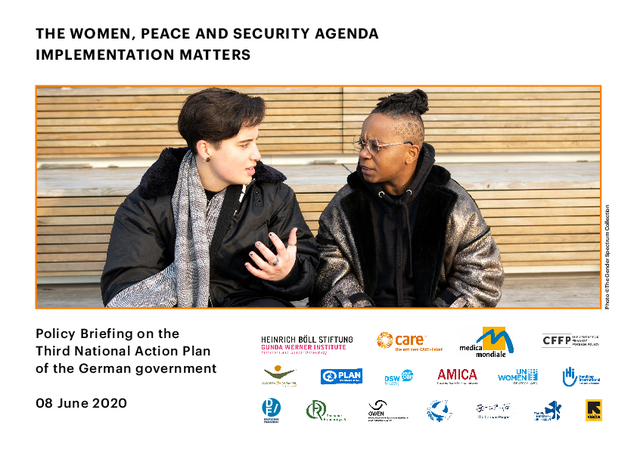Feminist foreign policy – for women’s rights, against violence
Feminist foreign policy means more than just promoting women. There is no single globally accepted definition that details what feminist foreign policy is and how it should be put into practice. The concept was popularised in 2014 by the then Minister for Foreign Affairs in Sweden, Margot Wallström. However, its origins can be traced back some 100 years to the international women’s peace movement during World War I. Their aim then still applies today: long-lasting peace.
If we are to achieve lasting peace and security, then according to feminist foreign policy it is necessary to establish gender justice and overcome discrimination and violence. In this way, feminist foreign policy can also make an effective contribution to the elimination of sexualised wartime violence.
Protection for women and girls in regions of war
medica mondiale has long advocated a feminist foreign policy for Germany as part of the country’s commitment to combat sexualised wartime violence. If it is implemented properly, feminist foreign policy can protect women and girls in war zones and crisis areas. One foundation in international law is Resolution 1325 of the United Nations (UN), which places a clear focus on the protection of women and girls and their core role as peacebuilders. Additionally, it mandates the contracting states to involve survivors and activists actively in peace processes. Their needs and perspectives must form the basis for political concepts and measures.
In order to be effective, feminist foreign policy needs to follow further broad principles. Our vision:
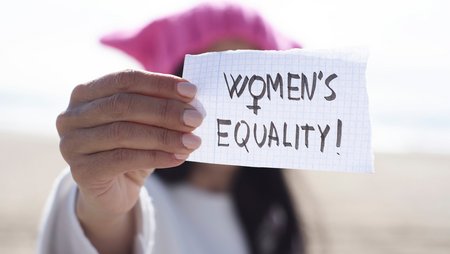
A feminist foreign policy has to be critical of power. It needs to identify existing power inequalities between the sexes within patriarchal societies and help to overcome them. Discriminatory power relations are the cause of sexualised and gender-based violence. In the end, the issue is the realisation of gender justice, so feminist foreign policy can be seen as having a transformative impact.
Feminist foreign policy requires an intersectional approach, which considers all existing power inequalities as well as multiple discriminations. The life situation of many marginalised groups should be a focus of the concepts and implementation measures. In this way, discriminations based on gender can be overcome along with those based on place or culture of origin, racialisation, sexual orientation, or disability.
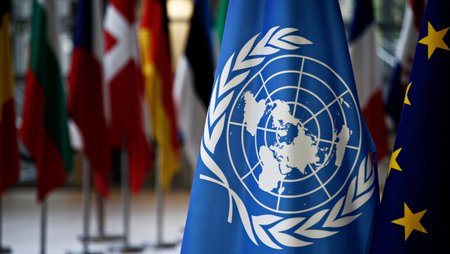
Feminist foreign policy observes human rights. It draws on the international framework for human rights, including treaties and institutions. An important part of this normative framework is the Agenda “Women, Peace and Security” from the United Nations (Resolution 1325).
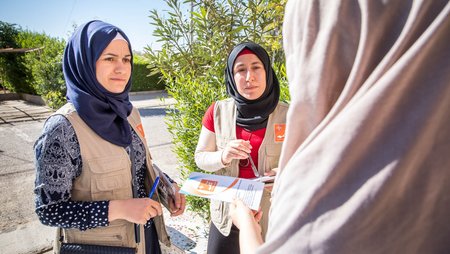
The elimination of sexualised and gender-based violence is a core objective of feminist foreign policy. The aim is to prevent violence and support survivors. In order to achieve this, the violence and its traumatic consequences are considered as a societal responsibility instead of an individual problem. The foundation for any measures has to be the needs of those affected. Survivors need access to long-term and integrated assistance in the form of medical care, psychosocial counselling, measures to help them secure their livelihood, and legal advice. It is important to offer this support in a stress and trauma-sensitive way.
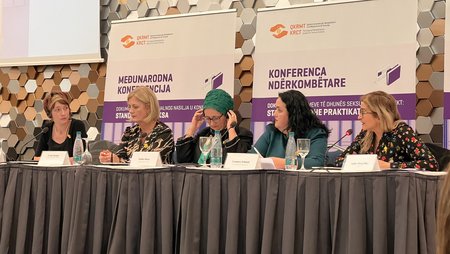
Activists and women’s rights organisations offer survivors important support and work to uphold their rights. However, as they do this they are often threatened, persecuted and obstructed in their work. Time and again they themselves are subjected to direct violence. It is very worrying to note the recent worldwide increase in anti-feminist ideologies and movements. This is why a feminist foreign policy needs to provide not only political support but practical assistance for activists and women’s rights organisations. It protects them diplomatically and helps them financially.

Feminist foreign policy protects and enhances the right to physical self-determination. This includes access to legal and safe pregnancy termination – since sexual and reproductive self-determination is an internationally documented human right.
Concept papers and strategies are needed and important. However, if a real difference is to be made, then feminist foreign policy has to ensure its own long-term and impact-oriented implementation. This means anchoring the policies institutionally and providing sufficient staffing and funding to put them into practice.

A feminist foreign policy understands that ending sexualised and gender-based violence is a task that needs to be addressed throughout the policy spectrum. There needs to be good coordination between the various policy fields, such as economic, development, defence or domestic policy, to ensure that the various measures complement each other as they are developed and implemented. For example, political measures to support women affected by violence outside Germany can be enhanced by asylum policy decisions within Germany if these ensure support for refugee women who have experienced sexualised violence.
Which governments are pursuing a feminist foreign policy?
With Margot Wallström as the Minister for Foreign Affairs, in 2014 Sweden became the first country in the world to commit itself to a feminist foreign policy. Since then, governments around the world have followed their example, although Sweden abandoned the concept of feminist foreign policy in October 2022.
The exact details differ from country to country. Here we provide a list of countries that have adopted a feminist foreign policy, along with their specific priorities:
Sweden was the first country to introduce a feminist foreign policy. Its principles were to be applied in the policy areas of diplomacy, trade, development aid and security. In 2019, the government published a handbook. Three years later, in October 2022, the new Minister for Foreign Affairs Tobias Billström ended the approach, which had until then been the world’s most comprehensive feminist foreign policy. The term “feminist foreign policy” is no longer being used by the Swedish government.
Canada decides on a feminist international assistance policy. The priorities in Canadian foreign policy are economic empowerment and the field of peace and security.
France followed in 2018. Paris calls its new approach “feminist diplomacy” (diplomatie féministe), prioritising diplomatic negotiations and development cooperation. In its coalition agreement, the government of Luxembourg announced its intention of pursuing a feminist foreign policy.
Mexico introduces a feminist foreign policy. The Latin American country aims to reduce and eliminate “structural differences, gender-based discrepancies and inequalities”.
In 2021 Spain and Libya decide to put feminist foreign policy into practice and after the parliamentary election in Germany, the three parties SPD, FDP and Greens agree a coalition agreement which commits them to a “feminist foreign policy”.
Chile introduces a “política exterior feminista”, as does Colombia. The governments of the Netherlands and Liberia announce their intention to adopt a feminist approach to foreign policy.
(as of: 11/2022)
Feminist foreign policy in Germany
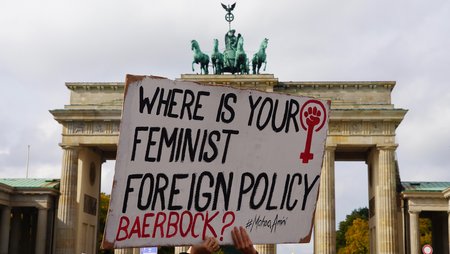
In the coalition agreement signed by the three governing parties SPD, FDP and Greens in 2021, they affirm their commitment to a “feminist foreign policy”. So what does this decision taken by the ‘traffic light coalition’ mean for politics in Germany?
What is in the coalition agreement?
In their coalition agreement with the title “Dare more progress” the ‘traffic light’ parties set down the following: “Together with our partners, we want to strengthen the rights, resources and representation of women and girls worldwide and promote social diversity in the spirit of a feminist foreign policy. We want to appoint more women to international leadership positions and ambitiously implement and further develop the National Action Plan for the implementation of UN Resolution 1325.”
The 3R+D formula – the german feminist foreign policy
When Sweden made the commitment to a feminist foreign policy, it created the 3R formula to express how it intended to empower women and girls:
- Rights: Combatting all forms of violence and discrimination that restrict the scope for action of women and girls.
- Representation: Promoting the participation and influence of women in decision-making processes at all levels.
- Resources: Providing the financial resources to support gender justice and equal opportunities.
Germany extended the 3R formula with a D for diversity. With 3R+D, Foreign Minister Annalena Baerbock wants to do more than simply put the focus on women and girls – the perspectives and needs of other excluded and discriminated groups needs to be considered, too.
Our demands to the German Federal Government
In its foreign policy, the German government has to:
- work towards overcoming discriminatory power relations at all levels and making gender justice a reality.
- making the elimination of sexualised and gender-based violence a priority. In this regard, it should promote measures which help survivors in a long-term, integrated and trauma-sensitive manner. Its approach needs to recognise both the violence itself and the traumatic consequences of this violence as a responsibility to be borne by society as a whole.
- provide political empowerment, financial support and diplomatic protection for women’s rights activists and women’s rights organisations.
The foundations of feminist foreign policy in international law
Feminist foreign policy makes reference to UN human rights and women’s rights treaties and the regional treaties which further develop them:
- the Convention on the Elimination of All Forms of Discrimination Against Women (CEDAW),
- the UN Resolution 1325 “Women and Peace and Security”, and
- the Istanbul Convention.

